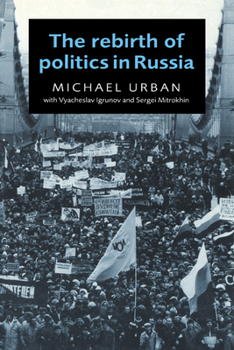The Rebirth of Politics in Russia
Select Format
Select Condition 
Book Overview
Blending first hand accounts of grassroots politics with an original theory of social relations under communism, this 1997 book seeks to explain one of the seminal events of this century: the rebirth of politics in Russia amid the collapse of the USSR. The authors trace the process from the pre-political period of dissident activity, through perestroika and the appearance of political groups and publications, elections, the formation of political...
Format:Paperback
Language:English
ISBN:0521566118
ISBN13:9780521566117
Release Date:March 1997
Publisher:Cambridge University Press
Length:444 Pages
Weight:1.40 lbs.
Dimensions:1.0" x 6.0" x 9.0"
Customer Reviews
2 ratings
The Grass Roots of Russia's Second Revolution
Published by Thriftbooks.com User , 17 years ago
This book by Michael Urban and the Yabloko State Duma Deputies Viacheslav Igrunov and Sergei Mitrokhin is a comprehensive study of the origins and course of emergence of post-communist politics in Russia. It is, in at least three ways, a valuable contribution to the slim body of literature on the political groupings and organizations which brought about Russia's peaceful revolution. First and foremost, it constitutes a fairly detailed and--with very rare exceptions--reliable handbook on the particulars of (1) the Soviet/Russian liberal and social-democratic dissident scene from the 1940s through the 1980s, (2) the "informals" (neformal'nye) movement in major Russian cities of the late 1980s and early 1990s, and (3) the altogether disappointing party-building process in Russia between 1988 and 1996. The three authors list numerous new details, participant observations, and insights especially on the dissident scene and "informals" which will, even for the native Russian specialist, represent precious additions to the factual knowledge accumulated so far. Second, the book presents an original application to the Russian case of a particular, decidedly non-elitist, pluralist concept of politics. Politics is here understood as a decision-making process characterized by a constant communication and interaction between the state, on the one side, and independent political society, and civil society, on the other. And, thirdly, the book represents a comprehensive interpretation of the major factors causing perestroika and the eventual systemic change between 1985 and 1991, and of the principal ills and missed opportunities in post-Soviet Russian politics between 1991 and 1996. The study is fixed on Russia's anti-Soviet uprising "from below" and focuses on actors outside the Soviet state structures until 1991. This makes it a very useful supplement to other large analyses of this period which show similar ambition, but (1) are instead centred on the activities of the top-elite in their peculiar institutional setting, such as the in-depth investigation of the Gorbachev factor by Archie Brown, or (2) explore the interaction between structural-institutional factors and political elite configurations, such as the comprehensive survey of the Soviet system's demise between 1985 and 1991 by Jerry Hough. Urban, Igrunov and Mitrokhin offer here a missing link with regard to these analyses. Concerning Brown's "Gorbachev-centric" approach, it becomes clear from their study that Gorbachev's and his assistants' gradual liberalization and democratization would have been much less consequential without the existence of some relevant--if dormant--extra-systemic political ideas and forces ready to fill quickly, and to expand further, the space initially opened up by intra-systemic reformers. With regard to Hough's explanatory scheme the authors provide proof that the substantial structural changes in Russian society which made a middle-class-revolution likely had first to
This excellent book deals with contemporary Russian politics
Published by Thriftbooks.com User , 26 years ago
Michael Urban, The Rebirth of Politics in Russia Cambridge University Press, New York, 1997 + 429 pages. Notes and references. Select bibliography. Index.Reviewed by Johanna Granville, Clemson University, Clemson, SC Michael Urban's book, The Rebirth of Politics in Russia contains such a wealth of important ideas that a reviewer is challenged to summarize them adequately in a mere 750 words. This excellent book deals with contemporary Russian politics from 1989 to the present, seeking in particular "to explain the rebirth of politics amid the collapse of the USSR." It lends great insight into the question of why the "democratic experiment" in Russia has not been more successful thus far. The book starts with a model of "politics," in which the authors attempt to "articulate the concept across three spheres (state, political society, and civil society) and along two dimensions (organization and communication)." In this reviewer's opinion, this first chapter is rather dry and abstruse. The remaining chapters, however, are more concrete and interesting. Chapter two turns to the so-called "pre-political period," i.e. the period before the appearance of the Gorbachev-era "informals" and the formation (in 1990) of bona fide political parties. It describes the various strategies employed by the dissident movement---launched in about 1965 with the trial of Sinyavsky and Daniel--to gain political influence, These included stressing legality and using the Soviet Constitution as a weapon against the communist authorities; organizing demonstrations; appealing to the West regarding human rights violations; and documenting such abuses in publications such as the Chronicle of Current Events. The authors claim that the dissidents of the 1960s and 1970s had two major weaknesses. The first was their failure to address the Russian people directly, instead focusing primarily on the communist authorities. This hindered their ability to build grassroots support. The second shortcoming--which continues to inhibit the pro-reform political parties in Russia today--was the dissidents' "abstemious attitude" toward politics and unwillingness to cooperate with the party-state. These dissident intellectuals preferred to philosophize than to compromise their ideals in the nitty-gritty organizational work. Chapters three, four, and five examine Gorbachev's programs of perestroika and glasnost and the resulting mushrooming of informal organizations (neformaly). Here the authors point to an interesting paradox. Very few dissidents from the pre-political period participated in the informals, despite the fact that many of Gorbachev's ideas emerged from dissident "samizdat" publications or even official but liberal publications from the 1960s (like Novy Mir). This can be explained in part by the dissidents' traditional "abstemious attitude" toward politics mentioned above. In addition, as the authors note perceptively, after decades of ba





